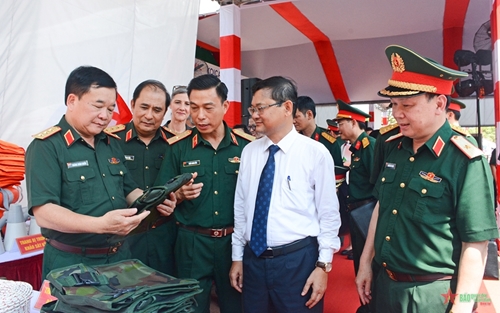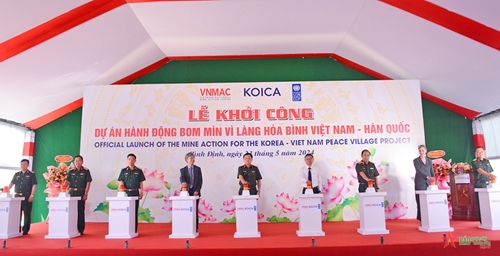Sr. Lt. Gen. Hoang Xuan Chien, Deputy Defense Minister, Head of the permanent agency of the national steering committee on settling consequences of post-war bombs and mines and toxic chemicals and Sr. Lt. Gen. Phung Si Tan, Deputy Chief of the General Staff, and deputy head of the permanent agency, attended the event.
    |
 |
|
Gen. Chien, Gen. Tan, and other delegates visit the space showcasing equipment and vehicles for the project implementation. |
The project, with the VNMAC as the project holder, is carried out with the capital investment of over USD 14 billion from the Korean government-provided non-refundable ODA from this May to December 2026 in three provinces, namely Thua Thien Hue, Quang Ngai and Binh Dinh.
The aim of this project is to settle aftermath of post-war bombs and mines so as to further protect people living in the project areas, contributing to boosting local socio-economic development, building harmonious, safe and prosperous rural communities responsive to climate change.
Under this project, technical surveys will be conducted on 15,000 hectares of land and some 6,000 hectares of bomb, mine and explosive-contaminated land in the three provinces will be cleared.
Addressing the event, Gen. Chien expressed thanks to the government and people of the Republic of Korea, KOICA, and UNDP for their effective cooperation over the past time.
    |
 |
|
Gen. Chien and delegates press the buttons to start the project. |
According to the Vietnamese deputy defense minister, there remain about 5.6 hectares of land contaminated with post-war bombs, mines and explosives in Vietnam. To speed up the settlement of the consequences of post-war bombs and mines, the Prime Minister approved a national action program on the field in the 2010-2025 period to mobilize all resources at home and abroad for the efforts.
He added that the Ministry of National Defense and the people’s committees of the three provinces agreed on the locations for the project's implementation.
Once the project is completed, people in the areas free from post-war bomb, mine and explosive contamination in the three provinces will feel secure to boost production, contributing to local socio-economic development.
Translated by Mai Huong